 |
A Chinese delegation led by assistant premier He Young arrived in Kathmandu just a month after a visit by Indian envoy, Shyam Saran. This has been viewed as a manifestation of the dormant rivalry between the two neighbouring countries. When communism was founded in China, India signed the 1950 treaty with Nepal, which was directly concerned with security. Ten years after the signing of the treaty, Nepal got its first elected prime minister, BP Koirala. It is said that Nehru had attempted to stop Koirala from visiting China, but did not succeed.
Indian relations with Nepal went cold after King Mahendra took over. The then Chinese defence minister, Chen Yi, had spoken in a warning tone that an attack on Nepal would be tantamount to an attack on China.
Nepali students, at the centre of Nepali politics, vandalised Chinese stalls and pictures of Mao Zedong in Kathmandu then. Suspecting the incident was incited by India, the Chinese embassy had warned that it would 'break the skulls' of those involved. India imposed a blockade when King Birendra bought arms from China, which ultimately led to the restoration of democracy in the country. A little later, Chinese Defence Minister Chi Haotian visited Nepal, which was the first visit from the Chinese Ministry of Defence. He wore plain clothes on board but alighted in the airport in an army uniform. The message was conveyed.
Chinese PM Lee Fung had told former PM Sher Babadur Deuba in his visit to China, that their relation with Nepal is important for security purposes. It was the first public statement of this kind from a Chinese high level officer in a long time. China had also expressed its intention to open a consulate in Nepal, when India opened a consulate in Birganj.
China has been following suit with India of providing assistance for development activities in the district. Bordering district Mustang is an example.
India is not only suspicious, but alarmed by the emergence of China. Indian premier Manmohan Singh's off-the-record remark that China was the major threat to India highlights the tensions.
But India and China also have common interests in Nepal to counter the West's inroads and support for the Free Tibet Movement. The Chinese delegation raised this concern during this week's visit. The presence in Nepal of UNMIN and OHCHR with support from the West is a headache for both India and China.
Both India and China also want stability in Nepal. This common interest might help Nepal's politics for an emergency, but safe landing.
READ ALSO:
The Third Force
"NC for changed Nepal"
All together, now
NAC faces pilot shortage
Rotten roads


